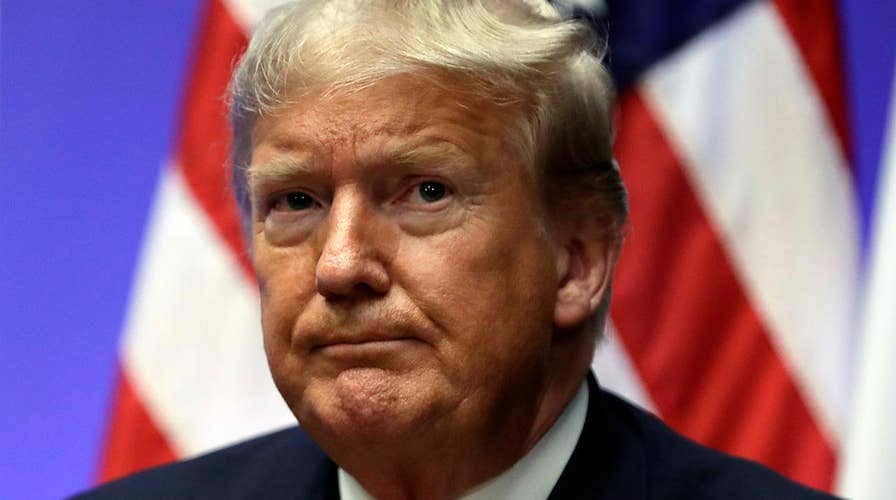President Trump says his new transparency plan will bring down health care costs
The Trump administration says forcing hospitals and insurance companies to disclose, up front, the full cost of all medical treatment will bring prices down by helping people shop for better deals; critics say studies show most Americans will skip or delay medical treatment if they know it's going to cost them a lot of money.
House Speaker Nancy Pelosi, D-Calif., is facing intraparty opposition ahead of a vote on drug pricing legislation that progressives have complained doesn't go far enough in regulating costs for Americans.
The Congressional Progressive Caucus (CPC) -- along with progressive Sens. Bernie Sanders, I-Vt., and Elizabeth Warren, D-Mass. -- pushed for more aggressive cost control.
According to Politico, CPC co-chairs Pramila Jayapal, D-Wa., and Mark Pocan, D-Wis., have privately said they had enough votes to reject the bill.
DR. MATTHEW STRYKER: WHO PROFITS FROM DRUG PRICE DECREASES?
While the bill likely won't gain traction in the GOP-led Senate, it could serve as an opportunity for Democrats to advance a drug pricing plan as the administration advocated its own.
The Democrats' legislation would focus on allowing Medicare to negotiate lower prices on the most expensive drugs. The Congressional Budget Office estimated the plan would save the agency $345 billion over a decade.
But according to the White House, it would block 100 drugs from reaching the market by threatening a 95 percent excise tax on sales of drugs that don't abide by Health and Human Services' pricing. Pelosi's plan would presumably have a more wide-reaching impact in that it would make negotiated drug prices available to everyone -- not just those with Medicare.
If progressives shoot down the legislation, it would likely feed the White House's narrative that progressives are thwarting the will of the leadership. "Is anyone surprised their socialist 2020 candidates want to drive their party even further left?" Republican National Committee (RNC) spokesman Michael Joyce told Fox News.
TRUMP LOOKS TO CANADA TO HELP LOWER US PRESCRIPTION DRUG PRICES
On Monday, Pelosi reportedly called the potential insurrection a "bad idea." She's currently leading her caucus in what appears to be a united front in impeaching President Trump. A progressive revolt could disrupt that unified image as Democrats head into the 2020 primary season. Leading candidates have promised bold reform like "Medicare-for-all," a prospect that could look even less likely if House Democrats are unable to compromise on drug pricing.
Rep. Alexandria Ocasio-Cortez, D-N.Y., an icon of the House's progressive wing, will likely oppose the legislation. “They stripped out everything that looked like progress,” spokesperson Corbin Trent said, according to The Intercept. Jayapal, in particular, has pushed for cost controls that would block price hikes beyond the rate of inflation.
Ocasio-Cortez previously clashed with leadership over a bipartisan bill funding immigration enforcement agencies during the migrant crisis. Pelosi has also indicated that the New York congresswoman wouldn't get leadership's support while pushing her signature Green New Deal. She's also said she's "not a big fan of Medicare-for-all," a policy favored by Jayapal, Warren, Sanders and Ocasio-Cortez.
Pelosi's office has described the bill -- titled the "Lower Drug Costs Now Act" -- as "bold action to level the playing field for American patients and taxpayers."
But according to the right-leaning Competitive Enterprise Institute (CEI), the plan would result in shortages and hurt new research and development.
CLICK HERE TO GET THE FOX NEWS APP
"Exorbitant healthcare costs are a direct product of decades of increasing government interference in the marketplace," CEI research fellow Patrick Hedger said in a statement to Fox News. "Ratcheting-up this interference, particularly with simplistic price controls, has predictable and undesirable results.”
On Monday, House Republicans introduced an alternative for drug pricing -- the "Lower Costs, More Cures Act" -- that would limit annual out-of-pocket costs for Medicare beneficiaries, among other things.




